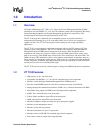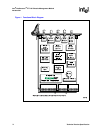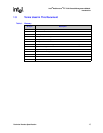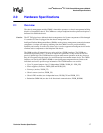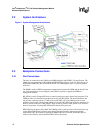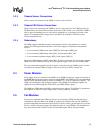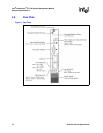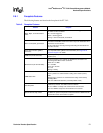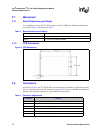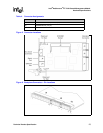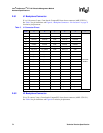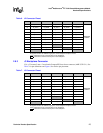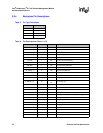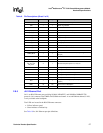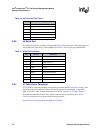
Intel
®
NetStructure
TM
ZT 7102 Chassis Management Module
Hardware Specifications
Technical Product Specification 21
2.6.1 Faceplate Features
The following features are found on the faceplate of the ZT 7102:
Table 2. Faceplate Features
Feature Purpose
Minor, Major, and Critical Alarm
LEDs
These LEDs indicate the presence of various event-triggered alarms.
The LEDs function as follows:
Off = no alarm triggered.
Amber = alarm triggered.
Blinking = alarm cutoff (ACO) is activated.
Alarm Cutoff (ACO) push button
This push button toggles the ACO state. When ACO is activated, the
active alarm LEDs blink and all of the alarm relays are deactivated. This
button does not clear alarms.
The ZT 7102 can be reset by pressing and holding the ACO button for
about five seconds.
Telco Alarm Interface (µDB15
connector)
This interface relays alarm signals to off-board equipment. Contact Intel
for a compatible cable (µDB15 to standard DB15). See Appendix G,
“Customer Support.” for details.
COM Port (RJ-45 connector)
This serial port may be used to access the CMM's Command Line
Interface (CLI).
Ethernet Port (RJ-45 with LEDs)
This port provides an out-of-band 10/100 Ethernet connection. The
port's integrated LEDs function as follows:
Yellow: Off = 10 Mbit
On = 100 Mbit
Green: Off = No Link
On = Link
Blinking = Activity
CMM Status LED
This LED indicates CMM status as follows:
Green = power is on and the board is acting as the master (active)
CMM.
Blinking green = power is on and the board is acting as the backup
(standby) CMM.
Red = the CMM needs attention (a critical problem exists).
Hot Swap LED
This LED indicates when it is safe to remove the CMM from a live
(powered-on) chassis. The LED functions as follows:
Off = the CMM is not ready to be removed from a live chassis.
Blue = the CMM is ready to be removed from a live chassis.
Ejector with hot swap switch
The ejector functions as a handle and a lever for installing or removing
the CMM. The ejector incorporates a switch that tells the CMM when the
board is about to be removed from a system.



